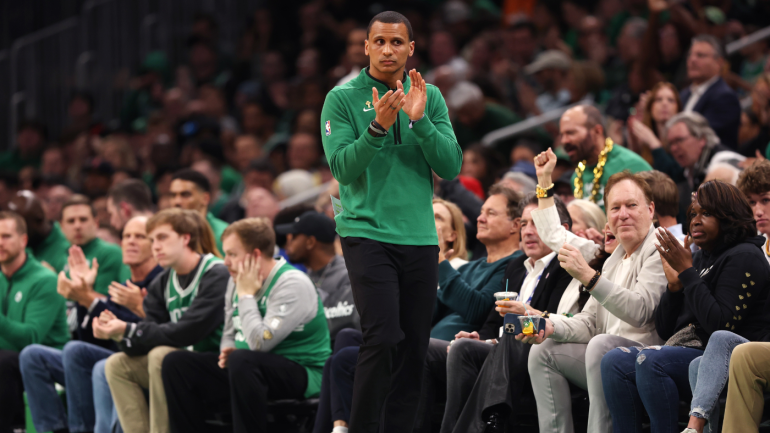
In the immediate aftermath of the Boston Celtics' 116-115 loss in Game 4 of their second-round series against the Philadelphia 76ers on Sunday, coach Joe Mazzulla did not express much regret about the final possession, which ended with the ball in Marcus Smart's hands as time expired.
No, the Celtics did not get a shot off, but "that was the play," Mazzulla told reporters. "We just had to play with a little bit more pace. We had the right matchup. Jayson [Tatum] got downhill, made the right play at the rim." Boston "got [Tyrese] Maxey in the pick-and-roll, and [Tatum] made the right play. We just didn't play fast enough."
The problem, in other words, was not that Mazzulla did not call timeout. It's that the Celtics took their sweet time and time was not on their side.
On Monday, Mazzulla changed his tune ... kind of.
"At the end of overtime, you know, hindsight's 20/20, I should have called it to help us get a 2-for-1 or get a couple more possessions," Mazzulla told reporters, via CLNS media. "And so, obviously, with 14 seconds left, down one, you want to get as many chances as you can, so I'll definitely learn from that."
His point, however, was not that coaches must always call a timeout in that situation. He didn't even say that he should have called timeout right after James Harden's corner 3 fell through the net. Ideally, Mazzulla would have liked the team to have "a clear understanding as a team that we gotta go faster to get a shot." Since that didn't happen, he could -- and, in retrospect, should -- have called timeout during the play.
"Once we're losing pace, I gotta call it, so we can get a shot up earlier," Mazzulla said.
A couple of notes on this:
1. Pace was the main thing
Please look at how casually the Celtics got into the set:
If the score had been tied and they wanted to make sure they would get the last shot, this approach would have made sense. Down by one, they needed to sprint down the court, run an action immediately and take the first open shot they could get.
Should Mazzulla have called timeout at 14 seconds, when the ball crossed halfcourt? At eight seconds, when Smart finally passed to Tatum? At five seconds, when Tatum was at the logo, finally putting the ball on the floor? At three seconds, when he was driving downhill and the defense was collapsing?
Calling timeout at any point would have been better than what happened, but there is no clear-cut answer. And these questions would be moot if Boston had just gone faster.
2. The Celtics did get the matchup they wanted
It's not that Mazzulla just loves chaos, hates timeouts and wants to stick it to the people who have been criticizing him on talk radio all season. The rationale for not calling timeout before a possession like this is simple, particularly if you have a team that can play 5-out on offense with playmakers who are used to targeting mismatches.
"It's something we talked about all year: I trust our guys to make the right play, it prevents the other team from getting matchups off the floor, it prevents the other team from getting their defense organized," Mazzulla said. "And hindsight's always 20/20, so it sounds good to say, 'Yes, we should've done this,' but we've prepared all year as a team to be able to take advantage of those situations. More times than not, it worked out for us."
It worked out for the Celtics earlier in the game. After Harden tied it with 16 seconds left in regulation, the Celtics got Maxey switched onto Tatum, who drove baseline, collapsed the defense and found Smart open on the perimeter. They couldn't have asked for a better look, and the ball was in the air with zeroes on the clock. Smart just missed it.
Doing the same thing at the end of overtime was "a decision to keep Maxey on the floor, keep [Joel] Embiid spaced, keep our spacing," Mazzulla said. "It's something that we worked on all year and something that we're pretty good at."
If Mazzulla had called timeout, Philadelphia coach Doc Rivers would have almost assuredly replaced Maxey, the team's most glaring defensive pressure point, with De'Anthony Melton. He could have potentially replaced Harden with Jalen McDaniels. He could have even taken Embiid out and gone to a switch-everything scheme. Whatever the Sixers' strategy, it would have been about complicating things for Boston, so it wouldn't be so easy to put them in rotation.
"I think in that particular situation, we're more organized than the defense because we know the matchups, we know who we're attacking and we know our spacing," Mazzulla said. "I think both can be true; I think you can be just as organized if you do call a timeout. At the same time, the variables are much different. Philly does a great job in the end-of-game situations of changing up their substitutions, changing up their matchups and changing up their coverages."
Attacking Maxey with Tatum worked so well that two Celtics -- Smart and Derrick White -- were open behind the 3-point line. It didn't matter, though, because they waited so long to do it.
"Obviously if it doesn't go well, it's a mistake," Mazzulla said.
Boston came as close as it possibly could have to taking a 3-1 lead, and it's commendable that Mazzulla took responsibility for the way the game ended. If the Celtics end up in another situation like this during the playoffs, though, don't be surprised if he chooses to trust his players again rather than calling a timeout. After this costly blunder, they should know not to drag their feet.
Celtics coach Joe Mazzulla says he should have called timeout on last possession of overtime in Game 4 - CBS Sports
Read More

No comments:
Post a Comment